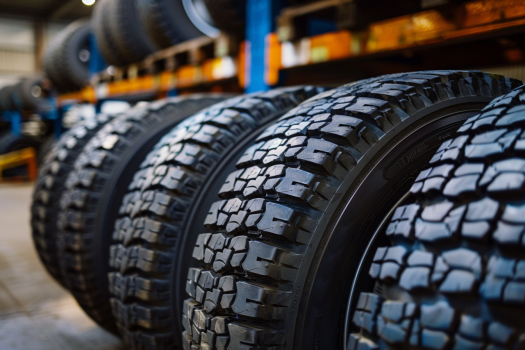Last Updated on November 10, 2024
Exploring the Truck Tire E-Commerce Marketplace
The automotive industry has not been immune to the profound changes brought about by e-commerce in recent years. The marketing, distribution, and sales of truck tires have all been profoundly affected by the rise in online buying, which changes in consumer behavior and technological improvements have fueled. This change introduces efficiencies and problems, involving more than simply a change in sales channels but a comprehensive redesign of the conventional business framework.

The Rise of E-Commerce in the Automotive Sector
Sales in the automotive sector have always come from dealerships and physical locations. On the other hand, e-commerce has given customers and merchants additional options. These days, digital platforms provide a more comprehensive selection of goods, affordable prices, and the ease of purchasing whenever and wherever. There are various reasons for the growth of e-commerce in the automotive industry:
- Consumer Demand: Online purchasing is becoming increasingly popular because it’s convenient, offers a wide selection, and allows fast pricing comparisons.
- Technological Advancements: Buying vehicle parts, including truck tires, is now more accessible and dependable thanks to the creation of interactive digital platforms, complex supply chain logistics, and safe online payment systems.
- Market Expansion: E-commerce allows businesses to reach a wider audience, transcending geographical boundaries that physical stores cannot.
- Customization and Personalization: Online platforms can offer personalized recommendations and custom options, enhancing customer satisfaction.
Overview of the Truck Tire Market
The truck tire market is an essential segment within the automotive industry, catering to many vehicles, from light trucks to heavy commercial vehicles. Specific demands and challenges characterize it:
- Product Diversity: The market has many tires, each intended for a specific truck type, load capacity, and road conditions. This covers off-road, all-season, and specialty tires for various weather conditions and terrains.
- Safety and Rules: Truck tires are essential to the secure movement of passengers and cargo, so they are subject to stringent safety requirements and rules.
- Innovation and Technology: New developments in tire technology, like longer-lasting materials and better tread designs, improve tire performance and longevity.
- Market Dynamics: Variables impacting the truck tire market, including the state of the world economy, fuel prices, and the expansion of the e-commerce logistics industry, raise the need for effective and dependable truck tires.
Historical Perspective
Over the years, the truck tire business has undergone a remarkable metamorphosis, moving from basic solid rubber designs to cutting-edge pneumatic and radial technology. Significant improvements in tire composition, functionality, and design have characterized this evolution, meeting the varied and exacting requirements of the transportation industry. In contrast to conventional retail techniques, e-commerce has brought about a new era of online sales and further transformed the sector. This change has expanded the market, given consumers more options, and revolutionized shopping by fusing convenience and technology. These shifts are captured by the historical viewpoint of the truck tire business, which shows a path of innovation and adaptation in reaction to changing market conditions and technical advancement.
Evolution of the Truck Tire Industry
Since its founding, the truck tire market has experienced substantial changes. Truck tires were initially made of simple rubber constructions that focused more on durability than efficiency or comfort. However, as technology and materials have advanced, more complex tire designs have been created.
Key Milestones in the Evolution:
- Early Developments: The commercial truck tire industry started in the early 20th century when trucks started using solid rubber tires. Although they were long-lasting, these tires had limited traction or stress absorption.
- The Development of Pneumatic Tires: Introducing pneumatic, or air-filled, truck tires greatly enhanced their performance and safety. This breakthrough improved handling and made more stress absorption possible.
- Radial Technology: The development of radial tires in the middle of the 20th century was revolutionary. Radial tires outperformed their predecessors’ performance, longevity, and fuel economy because of their multilayer design.
- Technological Innovations: In recent years, advanced materials and intelligent tire technologies have been introduced. These include improved rubber compounds for longer tire life, RFID tags for tracking tire health, and designs optimized for specific conditions, such as off-road or varied weather conditions.
Traditional Retail vs. Online Sales
The advent of e-commerce has had a profound impact on the retail landscape of the truck tire industry, presenting a stark contrast to traditional retail methods.
Traditional Retail:
- Physical Stores: Historically, getting truck tires required going to a dealership or physical store. This allowed consumers to examine tires and get prompt, hands-on help from salespeople.
- Local Market Restrictions: The products offered to customers in traditional retail were frequently constrained by geographic borders.
- Customer Relationship: Building personal ties with customers through physical storefronts establishes trust and encourages client loyalty.
Online Sales:
- Global Reach: Thanks to e-commerce platforms, customers may now choose from various tire brands and types anywhere in the world.
- Convenience and Comparison: Buying tires online allows you to browse and buy them from any location. Customers can also research products, read reviews, and compare pricing.
- Innovative Services: Many internet vendors provide extra services like online appointment scheduling, direct shipping to installers, and interactive tools to assist clients in selecting the appropriate tire.
Comparative Analysis:
- Accessibility and Convenience: Online sales outperform traditional retail in terms of accessibility, convenience, and variety, while conventional retail offers the benefit of in-person inspection and instant purchase.
- Pricing: Because online platforms have fewer overhead expenses and simplify price comparisons, they frequently offer more competitive pricing.
- Customer Experience: While online sales provide a more self-directed but thorough buying experience, traditional retail emphasizes individualized customer service.
The E-Commerce Effect
The traditional tire sales and distribution landscape has seen substantial changes due to the E-Commerce Effect, which has revolutionized the truck tire sector. The transition from in-store to online shopping indicates this change since online platforms offer customers more convenience, a comprehensive selection, and competitive pricing. Customers can now quickly compare products, read reviews, and make better judgments about what to buy, thanks to e-commerce. But it also brings particular difficulties, such as shipping, customer service, and establishing credibility online, which call for creative fixes. E-commerce represents a sea change in the truck tire industry, utilizing digital technologies to improve customer satisfaction and operational effectiveness.
Transforming the Buying Process
The advent of e-commerce has drastically changed the purchasing process in the truck tire market. Online transactions that offer speed and convenience replace traditional tire purchasing methods, which frequently involve in-person visits to tire shops or dealerships. Digital platforms that allow customers to peruse large catalogs, evaluate costs, and make well-informed judgments with a few clicks are the driving force behind this transition.
Key aspects of this transformation include:
- Accessibility: Customers may now browse a wide selection of tires online without being restricted by actual inventory at a store.
- Well-Informed Decision-Making: Online platforms frequently offer comprehensive product information, user reviews, and comparison tools to facilitate more informed decision-making.
- Purchasing Made Easy: All steps of the purchase process, including payment and delivery schedule, can be completed online, saving time and effort.
Benefits of E-Commerce for Truck Tires
E-commerce has brought numerous benefits to the truck tire market for consumers and sellers.
Some of these benefits include:
- Accessibility: Customers may now explore an extensive range of tires online without being limited by physical inventory at a store.
- Intelligent Decision-Making: Online platforms often include user reviews, comparison tools, and thorough product information to help consumers make better decisions.
- Purchasing Made Simple: You may complete the entire purchase process online, saving time and effort, including scheduling delivery and making payments.
Challenges and Solutions in Online Tire Retailing
Despite the advantages, e-commerce in truck tire retailing faces several challenges, which have led to innovative solutions.
Key challenges and solutions include:
- Delivery and Logistics: The weight and bulk of truck tires provide delivery and logistical difficulties. Two ways to find solutions are offering direct delivery to installation centers and collaborating with specialist logistic services.
- Customer Service: Offering knowledgeable counsel and assistance online might be difficult. AI chatbots solve simple questions, while quick access to human customer support is offered for more complicated ones.
- Returning Products and Warranty Issues: Online returns and warranty claims can be challenging. However, these problems can be resolved with explicit warranty information, effective return procedures, and clear return policies.
- Establishing Trust: It’s critical to win over customers’ trust when they buy expensive products like truck tires online. Offering thorough product details, client testimonials, and safe payment methods are some solutions.
Technological Advancements
Technological improvements have greatly influenced The truck tire market, particularly online sales. Customer experiences are changing due to innovations like AI-driven recommendations, virtual showrooms, and improved mobile commerce capabilities. Automating processes to improve customer service, streamline inventory management, and personalized shopping experiences are all made possible by artificial intelligence and machine learning. The growth of mobile commerce has increased accessibility and convenience even more by enabling users to access services and make purchases while on the go. In the tire sector, these technological advancements improve transaction efficiency and establish new customer happiness and involvement standards.

Innovations in Online Tire Sales
Technological advancements in online tire sales have significantly improved consumer satisfaction and operational effectiveness. These innovations focus on improving customer service, streamlining logistics, and enabling online tire sales while building an ecosystem.
Key Innovations:
Virtual showrooms and three-dimensional visualization: Thanks to sophisticated visualization technologies, customers may examine tires in great detail and see how they appear on their cars.
- Features for Intelligent Search: Improved search features, including filters and AI-powered suggestions, help customers locate the ideal tire for their needs.
- Customers Review: Customer reviews and ratings are now integrated directly into product pages on platforms, assisting consumers in making well-informed purchases based on others’ experiences.
- Inventory management that is Automated: Advanced inventory management systems ensure that stock levels are updated in real time, lowering the likelihood that an order will be canceled because the item is unavailable.
The Role of AI and Machine Learning
Online tire retail is changing, and AI and machine learning are becoming increasingly important. Machine learning, streamlining operations, and personalized client experiences are transforming truck tire e-commerce. They make inventory management more efficient, allow predictive analytics for market trends, and improve customer service by utilizing intelligent chatbots. By customizing product recommendations, spotting fraudulent activity, and maintaining quality control, these technologies significantly increase the effectiveness and security of online tire retailing.
Their applications include:
- Personalized Recommendations: AI systems examine surfing habits and consumer data to recommend goods that suit specific needs and tastes.
- Automation of Customer Service: AI-driven chatbots offer immediate customer care, helping with tracking orders, answering questions, and offering post-purchase assistance.
- Predictive analytics: Machine learning models assist in forecasting inventory needs, consumer purchasing tendencies, and market trends. This results in more effective stock management and focused marketing initiatives.
- Quality Control: Artificial intelligence (AI) solutions can enhance overall operational security and efficiency and can be utilized for fraud detection and quality control in the supply chain.
Mobile Commerce and Its Impact
The emergence of mobile shopping has changed everything in online tire sales. Mobile commerce has dramatically impacted the truck tire market, which provides unmatched accessibility and convenience. Customers can use their cell phones to browse, evaluate, and buy tires from any location. Mobile apps have improved client engagement with features like push alerts and augmented reality visualization. Mobile shopping has expanded the consumer base in the retail tire industry and opened new channels for tailored marketing and customer service.
The impact of Mobile Commerce includes:
- Enhanced Accessibility: Customers can now shop for tires anytime, anywhere, thanks to smartphones, which significantly improves the accessibility of tire purchases.
- App-based Purchasing: Many tire dealers have created mobile apps that provide a smooth purchasing experience, including simple reordering choices and push alerts for sales.
- Location-Based Services: Mobile apps can provide location-based services, such as locating the closest installation center or presenting offers exclusive to a particular area.
- Enhanced Customer Involvement: Mobile platforms enable more customer involvement with capabilities like augmented reality (AR), which lets users see tires on a truck and quickly share alternatives and reviews with friends or social networks.
Customer-Centric Approach
Understanding and satisfying fleet managers’ and truck drivers’ unique needs is a top priority in the truck tire industry’s customer-centric strategy. With this strategy, the online purchasing experience is customized to offer thorough information, user-friendly navigation, and individualized support. The key to ensuring clients find precisely what they need is leveraging data and technology to provide personalized recommendations and solutions. Furthermore, offering comprehensive post-purchase assistance and actively soliciting client feedback is imperative. Such a customer-centered approach increases happiness and loyalty and propels the e-commerce platform’s overall success in a cutthroat industry.
Understanding the Truck Driver’s Needs
In the truck tire business, a customer-centric strategy starts with an in-depth understanding of the demands of the truck driver. Since truck drivers depend significantly on their cars for work, tire performance, longevity, and safety are paramount. There are specific tire requirements for each type of trucking: long haul, regional, urban delivery, and off-road. Furthermore, drivers appreciate clear information regarding tire longevity, cost-effectiveness, and maintenance.
Understanding these needs involves:
- Direct Feedback: Gathering information from truck drivers via questionnaires, interviews, and casual encounters.
- Usage Data Analysis: Analyzing usage data allows tires to be customized to meet the demands of individual drivers by examining tire performance under different circumstances.
- Industry Trends: Remaining up-to-date on developments in the technology sector, laws, and regulations that affect drivers.
Enhancing Customer Experience in E-commerce
Enhancing the customer experience in e-commerce is essential for building loyalty and trust. In the context of truck tire sales, this means creating a seamless, informative, and supportive online shopping environment.
Key aspects include:
- User-Friendly Website Design: Ensuring the website is easy to navigate with precise categorization and detailed product information.
- Responsive Customer Service: Providing timely and helpful customer support, including live chat options and comprehensive FAQs.
- Efficient Logistics: Streamlining the delivery process and offering options like direct shipment to installation centers.
- Post-Purchase Support: Offering post-purchase services such as tire maintenance or renewal reminders.
Personalization and Recommendation Systems
E-commerce strategies emphasizing personalization and recommendation systems aim to offer a customized buying experience.
In truck tire e-commerce, this involves:
- Customized Recommendations: Using customer data and AI algorithms to suggest tires that fit the specific needs and preferences of the truck driver.
- Interactive Tools: Incorporating tools like tire selectors or configurators that assist customers in finding the right tire based on their truck’s make, model, and usage.
- Customer Profiles: Allowing customers to create profiles that track their purchase history and preferences facilitates more accessible repeat purchases and personalized suggestions.
- Feedback Mechanisms: Implementing systems for customers to provide feedback, which can be used to refine recommendations and product offerings.
Adopting a customer-centric approach in the truck tire e-commerce market is essential. It requires understanding the unique needs of truck drivers, enhancing the online shopping experience, and employing advanced personalization techniques. Focusing on these areas, “Tires Easy Truck” can significantly improve customer satisfaction, loyalty, and overall business success in the competitive e-commerce landscape.
Market Trends and Analytics
The truck tire market is changing quickly, driven by advanced analysis and impacted by new market trends, especially in e-commerce. Businesses like Tires Easy Truck need to comprehend these factors to stay competitive and serve their customers well.
Current Trends in Truck Tire E-Commerce
The growing need for sustainability in truck tire e-commerce is one of the most noticeable developments. Consumers are looking for tires that employ eco-friendly manufacturing methods and offer fuel efficiency because they care about the environment. Furthermore, tires made for specific uses—like all-weather, off-road, or tires best suited for lengthy trips—are becoming increasingly popular. The range of needs that truck operators have is reflected in this specialization.
Another trend is incorporating cutting-edge digital technologies into the online shopping experience. Customers may explore how tires seem and function in various scenarios using immersive visualizations made possible by augmented reality (AR) and virtual reality (VR) technologies. This technology improves the online purchasing experience, making it more engaging and educational.
Data-Driven Marketing Strategies
Data-driven marketing techniques are critical in the era of digital commerce. E-commerce platforms can develop marketing campaigns targeting specific audience categories by analyzing client data. Examples are personalized email marketing, niche internet ads, and content marketing based on consumer preferences.
Furthermore, social media analytics is essential for understanding consumer trends and preferences. Social media platforms such as Facebook, Instagram, and Twitter offer a plethora of data that may be leveraged to enhance marketing tactics, improve customer interactions, and forecast future buying patterns.
Predictive Analysis in Inventory Management
Predictive analysis in inventory management is another critical aspect. Predictive models can accurately forecast demand by analyzing past sales data, seasonal trends, and market conditions. This foresight is invaluable in maintaining optimal inventory levels, ensuring that popular tire models are always in stock, and avoiding overstock situations.
Such analysis not only helps in managing inventory more efficiently but also aids in understanding market dynamics. This can lead to more strategic purchasing decisions, better supplier negotiations, and improved operational efficiency.
Sustainability and E-Commerce
The relationship between e-commerce and sustainability is growing in importance in the truck tire business. As environmental awareness grows, companies and consumers are concentrating on eco-friendly activities. The logistics of e-commerce activities and tire manufacturing processes both reflect this change.
Eco-friendly Practices in Tire Manufacturing
Eco-friendly practices in tire manufacturing are crucial to reducing the environmental impact of tires. Tire manufacturers are increasingly adopting sustainable methods, including:
- Adoption of Sustainable Materials: Businesses are looking into synthetic rubbers derived from biomass, recyclable materials, and even dandelion rubber as alternatives to the conventional petroleum-based variety.
- Energy-Efficient Manufacturing: Tire manufacturers are implementing energy-efficient processes to cut carbon emissions. These processes involve employing renewable energy sources and streamlining production processes.
- Waste Reduction: When producing tires, efforts are made to reduce waste as much as possible. This involves recycling water used during the production process as well as leftover materials.
- Longer-Lasting Tires: Developing tires with longer life spans reduces the frequency of tire replacement, consequently decreasing the environmental impact of tire disposal and manufacturing.
E-Commerce and Green Logistics
Green logistics greatly aids sustainability in e-commerce. E-commerce companies, such as online tire retailers, are adopting eco-friendly logistics strategies:
- Most Effective Delivery Routes: Sophisticated routing algorithms help lower emissions and fuel usage by identifying the most effective delivery routes.
- Eco-Friendly Packaging: Cutting less on materials and switching to recyclable or biodegradable alternatives can help reduce waste.
- Carbon Neutral Shipping: Certain e-commerce platforms offer carbon-neutral shipping choices. In these alternatives, various environmental initiatives offset the carbon emissions resulting from the delivery process.
- Local Warehousing: E-commerce companies can minimize carbon emissions by strategically placing warehouses near their clients. This reduces the distance that products must travel.
Companies like Tires Easy Truck are pivotal in driving this change through eco-friendly manufacturing practices and green logistics. By prioritizing sustainability, we ensure a better environment and offer our customers products and services that align with their values.
Case Studies
In the specialized but rapidly growing e-commerce sector, online tire selling provides exciting case studies of innovation and success. These case studies offer insights from industry experts while showcasing the sector’s achievements and difficulties—success Stories in Online Tire Retailing.
Several internet tire sellers have established themselves as industry leaders in this cutthroat field. These success stories frequently have themes of adaptation, customer-centric strategies, and everyday innovation.
One noteworthy example is an online retailer that transformed tire shopping by incorporating cutting-edge digital tools like AR and VR into its platform. Thanks to this, customers may virtually ‘test on’ car tires. This innovation uplifted sales and significantly improved the customer experience.
Another success story comes from a retailer focusing on niche markets. This retailer offers specialized tires for segments like extreme off-road enthusiasts or electric truck operators. This specialization strategy enabled the retailer to capture a loyal customer base and stand out.
Lessons Learned from Industry Leaders
Industry leaders in online tire retailing have provided valuable insights into what drives success in this sector.
Key lessons include:
- Embracing Technology: It’s essential to keep up with technological advancements, whether in e-commerce, logistics, or customer support systems.
- Customer Understanding: Understanding customers’ demands and behavior is essential. Adapting the shopping experience to these requirements can considerably boost customer happiness and loyalty.
- Flexibility and Adaptability: Long-term success depends on your ability to quickly adjust to shifts in the market, client preferences, and technological developments.
- Ecological Methods: Using sustainable and eco-friendly procedures is a significant distinction and appeals to today’s consumers.
- Making Decisions Based on Data: Data analytics must be used to inform strategic decisions about marketing, customer interaction, and inventory management.
The Road Ahead
It is essential to consider the difficulties, opportunities, and future trends defining the truck tire e-commerce market as it grows. The e-commerce truck tire market is expected to grow, and exciting innovations will be seen shortly. Anticipations for the future point to a digital revolution featuring AI-powered personalization, eco-friendly procedures, and tires specifically designed for electric vehicles. As a result of global expansion, customers will have access to a wider variety of tire options.
However, new rules, increased competition, and data security must be addressed. The rise of AI-enhanced customer service, blockchain in the supply chain, and subscription models presents promising opportunities.
Future Projections for the Truck Tire E-Commerce
Several noteworthy projections mark the future of truck tire e-commerce:
- Digital Transformation: With an emphasis on AI-driven personalization and customization, the sector will see additional digital transformation. Consumers can anticipate increasingly engaging and interactive web experiences, such as augmented reality consultations and virtual tire fitters.
- Sustainability: These concerns will drive demand for environmentally friendly tire solutions. Tire manufacturers and retailers will prioritize eco-friendly production and distribution methods to satisfy the growing number of consumers who care about the environment.
- Electrification: As electric trucks gain popularity, the need for tires explicitly designed for use with electric vehicles (EVs) will sharply increase. Retailers must modify their knowledge base and product offerings in response to this change.
- Global Expansion: E-commerce platforms will expand their reach globally, making it easier for customers to access a broader range of tire brands and models. This expansion will also necessitate efficient international shipping and logistics solutions.
Emerging Opportunities and Challenges
Alongside these projections, emerging opportunities and challenges are on the move:
Emerging Opportunities:
- Artificial Intelligence-Powered Chatbots and Virtual Assistants: These tools will provide round-the-clock customer service by promptly and precisely answering customer inquiries.
- Blockchain in Supply Chain: Implementing blockchain technology in the supply chain is expected to improve transparency and guarantee the authenticity and quality of tires.
- Models of Subscription: tire subscription services, which provide hassle-free tire replacement and maintenance to clients, can grow in popularity.
Challenges:
- Data Security: As AI and data analytics increase, data security and privacy concerns will grow. E-commerce platforms will need to prioritize robust cybersecurity measures.
- Regulatory Changes: Evolving regulations related to tire manufacturing, labeling, and environmental impact will require tire e-commerce platforms to stay compliant and adapt quickly.
- Competition: As the industry expands, competition will intensify. Retailers must differentiate themselves through innovation, customer service, and sustainability.
Several obstacles and opportunities are on the horizon for the truck tire e-commerce sector. Enterprises such as “Tires Easy Truck” are well-positioned to seize these chances by using technology, eco-friendliness, and customer-focused strategies to handle the constantly evolving market. We are excited to continue serving the needs of truck owners and operators for many years by remaining on the cutting edge of industry advancements and offering them the most excellent online tire purchase experience.

Conclusion & Recommendation
As we conclude this comprehensive exploration of how e-commerce changes the truck tire industry, let’s recap its profound impact and glimpse into the future.
Recap of E-Commerce’s Impact on the Truck Tire Industry
The truck tire market has seen significant changes since the emergence of e-commerce. With a large selection, comprehensive information, and easy shopping from any location, online platforms have made purchasing tires easier. Integrating technology, such as augmented reality and data-driven marketing, has enhanced the customer experience. Eco-friendly methods are becoming more popular in tire production and distribution, and sustainability has become a significant concern.
Final Thoughts and Future Outlook
In these closing reflections, we have hope for the future. The online truck tire market is expected to continue expanding and innovating. Forecasts for the future emphasize advances in global expansion, sustainability, and customization. Blockchain in the supply chain and AI-driven customer support are new and exciting potentials. However, data security and regulatory compliance challenges need to be taken seriously.
Recommendation: “Tires Easy Truck” is still your go-to source if you’re looking for high-quality truck tires that complement these industry developments and trends. We will never waver in our dedication to offering a flawless, customer-focused tire shopping experience.
Discover Your Perfect Truck Tires Today
The road ahead is bright, and we invite you to join us on this journey towards a more accessible, sustainable, and innovative truck tire future.
FAQs
What percentage of tires are sold online?
The online tire market has been growing steadily. According to the latest data, approximately 7-10% of tires are sold online. This percentage is expected to rise as more consumers embrace the convenience and options e-commerce platforms offer.
What is the global tire industry trend?
The global tire industry is trending towards sustainability and technological advancements. Manufacturers focus on eco-friendly practices, while digital technologies like AI and data analytics shape the industry’s future, enhancing customer experiences and optimizing supply chains.
What is the outlook for the tire industry?
The outlook for the tire industry is promising, with increasing demand for specialized tires, sustainable manufacturing, and global expansion. Emerging trends like electrification and data-driven marketing are set to drive growth, making it an exciting and evolving sector.
What is the market size of the tire industry?
The global tire industry is substantial, with over $200 billion market size. This figure continues to grow as the industry adapts to changing consumer preferences and embraces innovation in tire manufacturing and distribution.
What are commercial truck tires?
Commercial truck tires are designed for heavy-duty vehicles like trucks, buses, and delivery vans. They are built to withstand the demands of long-haul journeys and various road conditions, making them essential for the transportation and logistics industry.
How has eCommerce revolutionized business?
eCommerce has revolutionized business by offering a platform for online sales, enabling businesses to reach a global audience. It has streamlined the buying process, personalized customer experiences, and transformed supply chain management, increasing efficiency and competitiveness.
How is e-commerce changing the world?
eCommerce is changing the world by reshaping retail, altering consumer behaviors, and fostering global trade. It has expanded access to products and services, driven technological innovation, and created new economic opportunities, making it a transformative force.
What is the significance of e-commerce?
The significance of e-commerce lies in its ability to provide convenient and accessible ways for consumers to shop while offering businesses vast growth and efficiency opportunities. It has become a cornerstone of modern commerce, shaping industries and economies worldwide.











 English
English Français
Français Español
Español